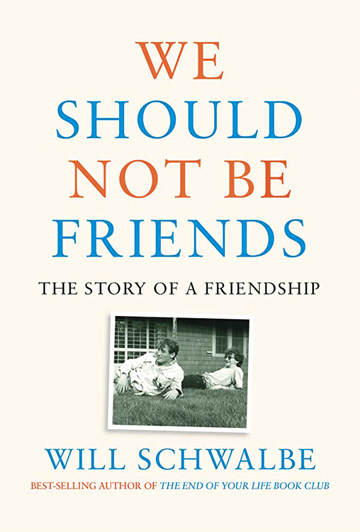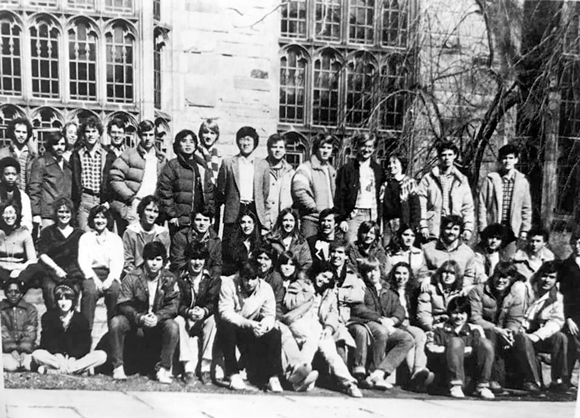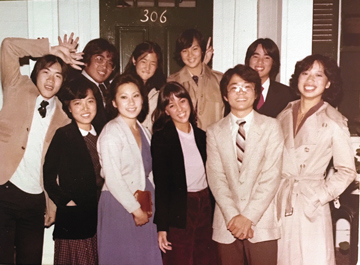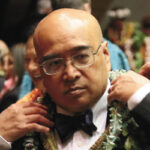
Friends with Pens
Gilbert S.C. Keith-Agaran
Over the years I made it a point to pick up or at least leaf through, books authored by college classmates—some I knew but mostly only passing recollection of a name. For example, I ran into the provocative Naomi Wolf (The Beauty Myth: How Images of Beauty Are Used Against Women; Vagina: A New Biography) a few times as an undergraduate but I wouldn’t say I knew the Lowell High graduate very well (she could be called an early prototype of today’s influencers).
With two South Carolinians as roommates, I had common acquaintances with W. Hampton Sides, a prolific popular historian. His books cover an eclectic period of eras and topics including Blood and Thunder: The Epic Story of Kit Carson and the Conquest of the American West, On Desperate Ground: The Epic Story of Chosin Reservoir–the Greatest Battle of the Korean War, Hellhound on His Trail and Ghost Soldiers. But the one I particularly enjoyed was Americana: Dispatches from the New Frontier—a mix of travelogue and profiles of modern American just off the edge of mainstream culture throughout the country, from Pentecostals to anarchistic and freewheeling skateboarders, to the Las Vegas Consumer Electronics Show.
I skimmed Nicholas Christakas’ Blueprint: The Evolutionary Origins of a Good Society in the midst of the Halloween controversy when he headed Silliman College, and Eric Metaxas’ Letter to the American Church before he went full-evangelical MAGA apologist for TFG.

Image courtesy Gil Keith-Agaran
The latest, highly recommended by other classmates, is a memoir of an unlikely friendship by Will Schwalbe, We Should Not Be Friends. I pre-ordered a copy and it arrived a week ago. It sucked me in from the start: “By the time I was a junior in college, I’d already met everyone I cared to know. I was friends with most of the other gays and lesbians: this wasn’t difficult because, in the early 1980s, not many of us were out of the closet …I knew the theater people … I knew many of the people who styled themselves as writers … I also knew those I didn’t want to know. The jocks. And they didn’t seem to want to know me. In the dining halls, they filled boisterous tables. They wolfed down epic platters of scrambled eggs. They wore baseball caps backwards and moved in packs.”
Schwalbe chronicles an unlikely friendship with college wrestler Chris Maxey—people called him “Maxey”—over the course of the forty-odd years since graduation. It was a distant time. Schwalbe, Maxey and their classmates arrived in New Haven only a dozen years removed from women being admitted to the school in the late-1960s. Ivy League schools were still tradition laden places—probably still are in many ways.
Will and Maxey’s relationship was forced in part by one of those Yale institutions—the senior or secret society (Schwalbe never names the one he joined but it wasn’t Skull & Bones since Will’s group included women). Over the decades, with Schwalbe pursuing a career in book and digital publishing and Maxey moving from the SEALS to teaching and then starting a school in the Bahamas, the book captures much of the social changes that have rushed through our lives.
The school song suggests, “Bright College years, with pleasure rife,/The shortest, gladdest years of life;/How swiftly are ye gliding by!/Oh, why doth time so quickly fly?/The seasons come, the seasons go,/The earth is green or white with snow,/But time and change shall naught avail/To break the friendships formed at Yale.” For those of us who came of age in the mid-1980s, we did not have the tools that allow today’s students the ease to maintain close bonds after graduation. Email was something new and geared towards the academics. We had no cellphones, let alone today’s “smart” phones. If we wanted to contact college friends, we called on regular landline telephones (time zones allowing) or wrote real letters (relying on the U.S. post office to deliver our notes within a reasonable time and hoping the address we had for classmates was still current). The book is honest and reveals Will’s regrets and doubts we all experience in our changing and developing relationships and friendships, yet gradually comes to an epiphany about living now. As he describes his thoughts after an evening with his friends and their adult children: “ … maybe the sense of peace I was feeling in that moment was my head making room for the present, without the past and the future pressing so hard. No need to regret our history—I shared too much with these people to dwell on that. No room for the future—the two youngsters would take care of that for us. Just the present.”

Photo courtesy Gil Keith-Agaran
Even beyond an actual memoir, of course, many of my classmates have written what they know.
A novel by a classmate that I re-read every couple of years is Julie Otsuka’s When the Emperor Was Divine—a novel about the Japanese American experience on the West Coast in World War II. It’s the first book where I knew the person’s name (the Asian American Students Association was not a large group). Julie followed with The Buddha In the Attic, about Japanese picture brides in the early 1900s. Julie last year released The Swimmers, set closer to our present time, which I plan to read because at my age, the challenges of memory explored in the novel weigh on my mind.
Another of the four islanders in my class, ‘Iolani graduate Ken Goldstein has a career spanning Hollywood and Disney to Silicon Valley. He penned a pair of I expect autobiographical novels exploring the industries, music and places he has lived—This is Rage and From Nothing. He also issued a management manual gleaned from his experiences at start-ups, spin-offs and legacy companies: Endless Encores: Repeating Success Through People, Products and Profits.
Residential college classmate Rachel Toor worked in college admissions at Duke and wrote “Admissions Confidential: An Insider’s Account of the Elite College Selection Process” and Write Your Way In: Crafting An Unforgettable College Admissions Essay. Now a creative writing professor, her amusing and witty advice Misunderstood: Why The Humble Rat May Be Your Best Pet Ever is worth picking up. A runner since undergraduate days, she also penned Personal Record: A Love Affair with Running. I admit I haven’t read her memoir of keeping pets and dropping boyfriends The Pig and I: Why It’s So Easy to Love an Animal, and So Hard to Live with a Man.
One of my roommates, Mark Weinberg, is a career civil rights attorney in his Chicago hometown. Out of his crusade in support of panhandlers’ first amendment rights outside Chicago sports venues, he penned Career Misconduct: The Story of Bill Wirtz’s Greed, Corruption, and the Betrayal of Blackhawks’ Fans—a book length polemic against the late billionaire hockey team owner. He gave me an autographed copy.

Photo courtesy Gil Keith-Agaran
In the early years after graduation, I made it a point to attend reunions, showing up for the fifth, tenth, fifteenth and I think the twentieth. I’ve since missed the twenty-fifth, thirtieth and thirty-fifth as life, age, health and distance caught up with me.
Schwalbe, a professional writer, captures where I hope we are now mentally: “I realize that most of the things I had worried about for the last four decades lived only in my head, and that while it was almost certain that I am the bigger nutcase, Maxey was a nut, too. He’d had his own list of things he worried about. I knew that all my friends carried similar lists in their heads. Maybe that’s part of the reason my friends are my friends. We care enough to spend time worrying about the ways that our actions, including the times we neglect to act, affect one another. And, of course, we enjoy one another’s company. We like the people our friends are, and the person we are when we’re around them. After decades of worry, maybe it wasn’t more complicated than that.”
I guess that means no more self-deprecations. No humble brags.
As Schwalbe and Maxey admit to each other, “You know, I think you know me as well as anyone knows me, Maxey. The truth is, and I mean this, there’s not much to know.” “You, know, that’s another thing we have in common, Schwalbs. I’m pretty shallow, too. I guess we are just two middle-aged shallow guys who are pretty frickin’ lucky to be here.”
Damn, I wish I had written that. Actually, I wish I had said that.
 Gilbert S.C. Keith-Agaran attended Yale College and Berkeley Law School on the mainland. He wrote some sports for the Yale Daily News and some satirical pieces for his own indulgence during college and law school. He presently represents Central Maui in the Hawai‘i State Senate.
Gilbert S.C. Keith-Agaran attended Yale College and Berkeley Law School on the mainland. He wrote some sports for the Yale Daily News and some satirical pieces for his own indulgence during college and law school. He presently represents Central Maui in the Hawai‘i State Senate.
